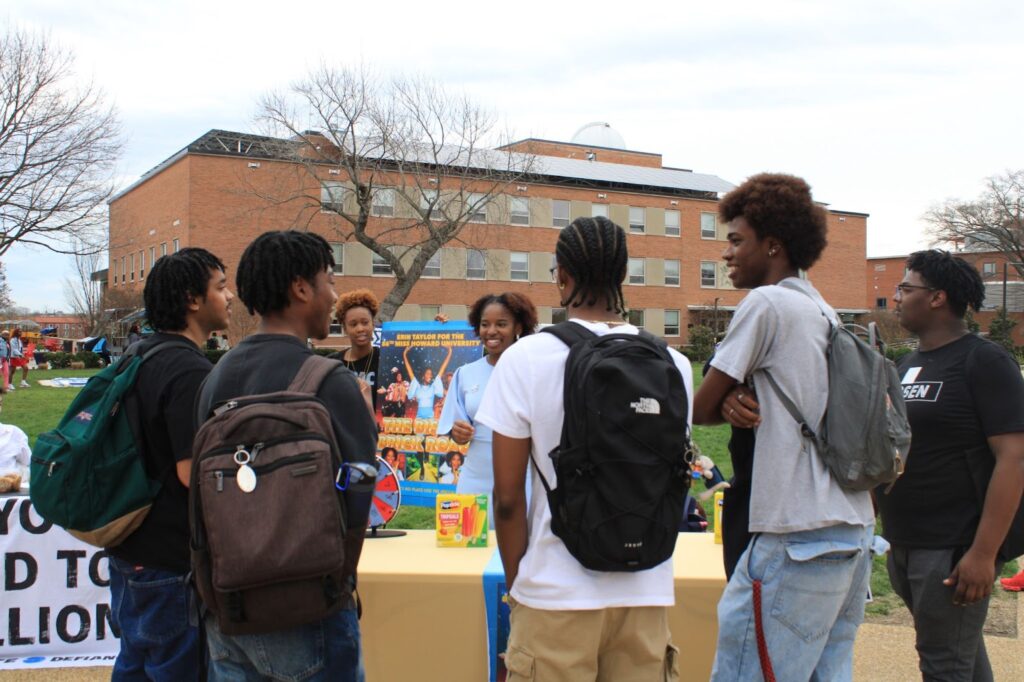
As the campaign season launched the first week of March, Howard’s election candidates and an elections commissioner offered insights into the demanding nature of maintaining their campaigns.
Justyce Reed, a junior political science major and legal communications minor from Indiana, shared her perspective on the commitments and financial investments required for her campaign.
“Time commitment-wise for my platform, it took a lot of time to try to figure it out,” she said. “Financially, I am using my savings, to be honest. I am using a budget and not trying to spend a lot.”
Reed, who is running for COAS Senate, has used a grassroots approach as she involves herself in her campaign logistics and creates campaign materials with the help of her friends.
“Having friends and family that can lift you up when you’re feeling down, stressed and picking up the slack in areas that you can’t attend to has been so helpful,” Reed said.
Similarly, Bria Nartey, a sophomore double majoring in honors African American studies and political science, navigates the complexities of the campaign season. Nartey emphasized the importance of using organizational tools such as task lists, Google calendar and support networks to maintain balance.
“It is a lot, but once I put my mind to something there’s nothing going to stop me,” Nartey said.
Like many of the candidates, Kelsey Rainey, a senior political science major from New Orleans, describes her current role as an elections commissioner as time-consuming and difficult at times, but necessary to ensure a fair process for all the candidates running.
“I think that the work is definitely difficult to do,” Rainey said. “It’s like a big job but I was really interested in the passion that students have in leadership. I think student leadership is something that’s been very instrumental at Howard.”
From candidates being required to submit materials for their campaign for approval, such as proposed flyers, to candidates having to request time and space for tabling, these regulations aim to maintain an equitable environment for all candidates and assist the elections commission in ensuring this, as outlined in Section 512 of the Student Elections Code.
To run for any Howard University student body position, candidates must adhere to specific eligibility criteria outlined in the elections commission. Among these requirements, students are mandated to maintain a minimum GPA of 2.7 to ensure a baseline level of academic achievement and commitment.
According to Section 308 of the election guidelines, candidates are prohibited from simultaneously seeking multiple elected positions to ensure fair competition and distribution of roles.
Financial regulations, as stipulated in Sections 602 and 603, impose spending limits to prevent any undue influence of monetary resources in elections. Specifically, candidates running for HUSA or Trustee positions are limited to a maximum expenditure of $7,500. All other candidates face a cap amount of $5,500.
Additionally, candidates are required to submit financial statements promptly before Election Day to verify that all candidates are within the financial limits specified in the election code, which Rainey said is for more effectiveness and due diligence on the committee’s end.
Non-compliance would lead to penalties, resulting in strikes against the candidate for violating protocols established by the elections commission, which could ultimately disqualify them from running after accumulating three strikes.
In addition to these required submissions, candidates are also required to attend Crossfires and Speakouts, Rainey explained. Speakouts, “is the chance for students to present their platforms” and Crossfires, “a debate-style event,” where students “debate with other candidates petitioning for the same position as them.”
“The budget is a budget,” Anyiah Lobley, a junior majoring in TV and film from Milwaukee, Wisconsin, said. During her interview, she revealed that she already spent $1,500 on her pageant dress and setup, which includes a camera for students to have their headshots taken.
With commitments such as being a full-time student, participating in rehearsals, and organizing tabling events, Lobley emphasized the importance of utilizing every day effectively while campaigning.
Like many other candidates, Lobley is committed to staying within her budget. She relies on support from her Milwaukee community, DMV communities and family for financial assistance.
Although there aren’t specific resources given to candidates regarding how to fundraise or how to campaign, Rainey always encourages each candidate to connect with the people no matter what funds a person may have access to.
Jay Jones, a junior political science major from Texas running for HUSA Executive President, shared her insights into the time and financial commitments required for running a successful campaign.
“We’re glad to be able to have, with at least the HUSA exec campaign, or bigger campaigns and things along those lines, a lot of sponsors and corporate sponsors who very much help us out in terms of the monetary side of things,” Jones said.
However, she noted that significant time and effort are still necessary and that means sacrifices in terms of personal commitments.
She elaborated more about her personal experience, “For me, I don’t have a lot of parental support due to my background… so for the most part it is either self-financed from myself – I work a job – and then also I fundraise. We do a lot of work with fundraising and we do a lot of working with outside entities that sponsor certain things.”
Jones also emphasized the significance of gradually mastering the basics of fundraising and networking to support her campaign, advising future candidates to start small and work their way up in a similar fashion.
Copy edited by D’ara Campbell

